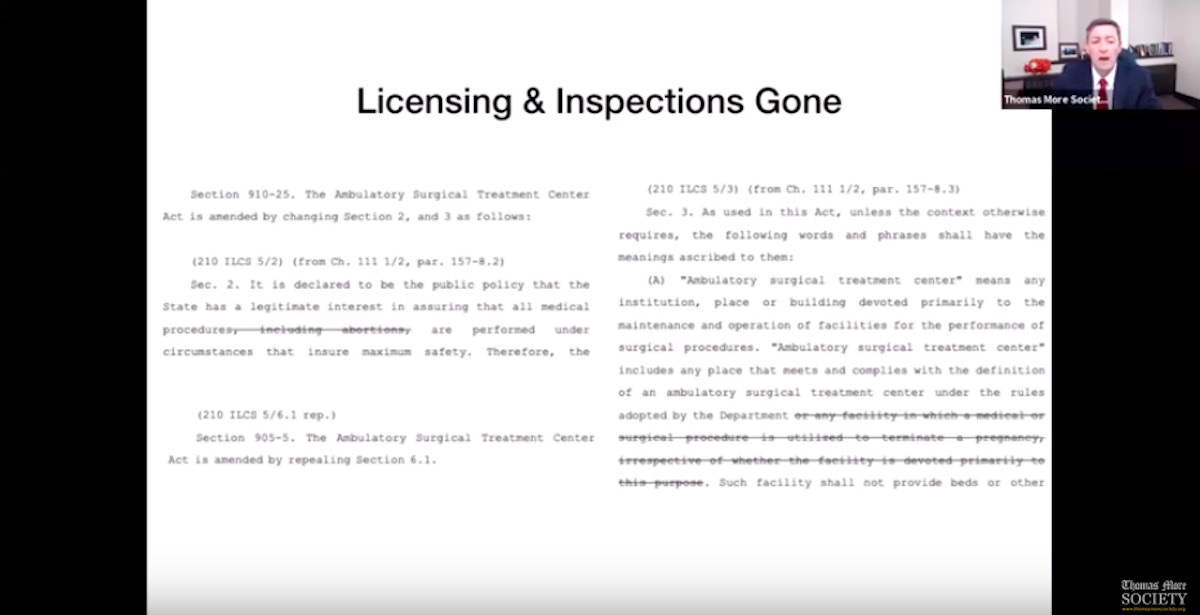The Thomas More Society law firm based in Chicago intends to fight Illinois’ sweeping new abortion law — and this week, the firm held a webcast laying out plans to do just that. But beyond this plan, what was presented is nothing short of shocking; the new Illinois Reproductive Health Act (RHA) stipulates that even 911 call records to abortion facilities will no longer be accessible to the public under the Freedom of Information Act — deliberately hiding information on the dangers of abortion from the public. In addition, no state abortion data whatsoever will be made available to the public.
Peter Breen, vice president and senior counsel of the Thomas More Society (TMS), offered a comprehensive overview of the almost unimaginably broad scope of the RHA, including even more repealed safety measures than pro-lifers were likely aware of when the bill was introduced and debated. Breen then spoke about the legal vulnerabilities in the RHA, given existing Illinois state law as well as federal law. Finally, he issued an appeal to Illinoisans to join the legal fight against the RHA by serving as plaintiffs or medical advisors in court cases that will be introduced.
What did the Reproductive Health Act actually do?
Breen spoke first about the sweeping impact of the RHA on the practice of abortion in Illinois. Breen said the RHA:
- Enshrined abortion as a fundamental right in the Illinois Constitution, over and above other rights like the right to freedom of speech.
- Declared that the preborn child has NO rights under Illinois law: “a fertilized egg, embryo, or fetus does not have independent rights under the laws of this state” (part C under “Fundamental reproductive health rights”).
- Exempted all abortion-related documentation provided to the state from the Freedom of Information Act (for example, pro-lifers will no longer be able to request 911 call records when an ambulance takes an abortion patient to a hospital. No abortion-related documentation, not even redacted documentation, submitted by abortion providers to the state will be available for review by the public).
- Removed the licensing and inspection requirements for facilities that perform abortions, amending The Ambulatory Surgical Treatment Center Act so that mention of abortion facilities is literally struck from the record. Additionally, the law previously read,”It is declared to be the public policy that the State has a legitimate interesting in assuring that all medical procedures, including abortions, are performed under circumstances that insure maximum safety.” The words “including abortion” were, shockingly, removed from the law by the RHA. Apparently, abortion safety is not paramount. Breen cited the case of Rockford, Illinois’ “House of Horrors” being shut down in 2012 due to egregious safety concerns found during an inspection.

Thomas More Society webcast screenshot. “Including abortions” is removed from the paragraph at left regarding medical procedure safety.
- Removed the requirement that abortion-related deaths be investigated by a coroner. This completely contradicts comments made by RHA sponsor Rep Kelly Cassidy in a June 2019 interview with NPR, where she said ” Ultimately, it changes very little. What it does is codify our status quo, for the most part.” The RHA did not “codify” (or arrange a series of rules into an organized system) current law, it fundamentally changed existing law. As Breen stated, Illinois has a history of shoddy abortion procedures, and this removal of the coroner’s investigation of abortion-related deaths defies common sense
- Removed criminal penalties for doctors who intentionally perform an abortion on a woman who is not actually pregnant.
- Ended reporting of abortion data to the public by Illinois Department of Public Health (IDPH). Statistics on out-of-state women seeking abortions, how many women seeking abortions are minors, etc. will no longer be made available.
- Struck down a previous requirement in Illinois law to document a medical reason for late-term abortions performed after viability (generally considered 23-24 weeks). Previously, very few late-term abortions were done in Illinois because doctors didn’t want the potential legal repercussions from having to document why they were deliberately killing a viable human being rather than simply delivering the baby. This opens the door to many more late-term abortions being performed in Illinois, and Breen stated that the Thomas More Society is already seeing limits for abortion extended from 18 weeks gestational age up through 24 weeks gestational age
- Repealed some 40 years of Illinois abortion law, including the Illinois Abortion Law of 1975, the Partial-birth Abortion Ban Act (was previously enjoined), and the Abortion Performance Refusal Act
- Ended the practice of performing pathology testing on all aborted babies to check for medical issues, now opening the door for Illinois to become a fetal harvesting and experimentation mecca
- Ended the requirement that a second physician be present during late-term abortions to care for the baby if it survives.
- Ended the requirement that fetal anesthesia be offered when viable, pain-capable babies are aborted.
- Mandated that certain insurance plans cover elective abortions, without additional cost-sharing or extra deductibles
READ: ‘Dark day’: Illinois governor signs abortion bill far worse than New York’s
What’s the plan to fight back against the Reproductive Health Act?
Breen shared that the main approach to overturning the RHA will specifically target the requirement for insurance plans to cover elective abortions. A two-pronged strategy will target the RHA’s incompatibility with current Illinois law and federal law, which always supersedes state law according to the U.S. Constitution’s Supremacy Clause.
Reproductive Health Act Violates Existing State Laws
First, the Illinois Religious Freedom Restoration Act says “the government may not substantially burden a person’s exercise of religion” unless there is a “compelling governmental interest,” and that the “least restrictive means” of furthering that governmental interest are being used. TMS will argue that forcing Illinois taxpayers to subsidize elective abortions constitutes a substantial burden on their right to exercise their religion. Ultimately, courts will have to address the question of whether private insurance plans will be forced to fund elective abortions.
Second, the Health Care Right of Conscience Act says “it shall be unlawful for any public official… to coerce, disqualify, or discriminate against any… health care payer” for refusing to pay for any procedure that violates their conscience. Breen believes this Act may cover any objecting individuals who purchase insurance in Illinois.
Federal Law Trumps Reproductive Health Act
Finally, Breen cited the Weldon Amendment, which prohibits a state government from receiving federal funds if they discriminate against health insurance companies that refuse to provide abortion coverage. Breen said that this translates to billions of dollars in Illinois’ yearly revenue.
Wanted: A Few Good Clients
The Thomas More Society seeks plaintiffs to represent in lawsuits against the RHA:
- Small businesses who provide insurance to their employees, including
- Small and mid-size businesses
- Small and mid-size churches
- Religious Nonprofits
- Individuals who purchase insurance through the insurance healthcare exchange (Affordable Care Act)
- Individuals who receive their insurance through state or local government
- Illinois taxpayers
The Thomas More Society also seeks to hear from healthcare professionals, especially those with obstetrics/gynecology (OB/GYN) experience, either to serve as plaintiffs or to offer medical expertise in the cases that do go forward.
“Like” Live Action News on Facebook for more pro-life news and commentary!







